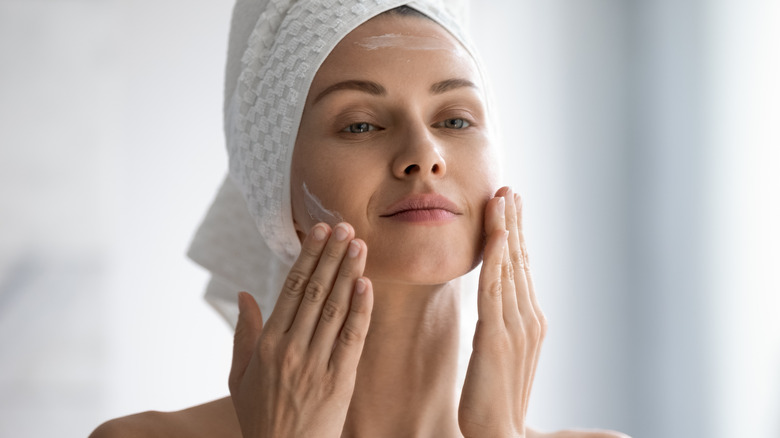Is It Bad For Your Skin To Sleep With Sunscreen On?
Sunscreen can prevent skin damage before it happens. It serves as a protective barrier between the sun's UV radiation and our delicate skin to prevent wrinkles, age spots, and the development of skin cancer, reports the Skin Cancer Foundation. No doubt that sunscreen is important for daytime use, but what about at night? You might see SPF indicated in certain moisturizers and other skincare products (per LiveStrong). If we wear these products to bed, are there any benefits to be gained from dabbing a little sunscreen on before our head hits the pillow?
As it turns out, it may be beneficial to wear sunscreen at night. Board-certified fellow at the American Academy of Dermatology Dr. Suzanne Friedler explains, telling LiveStrong, "There are some newer studies that show that fluorescent lights and even some of the lights from your computer can possibly contribute to photoaging." For this reason, a little nighttime sunscreen may help protect against the potentially damaging effects of these light sources, although more research is still needed.
On the flip side, however, leaving sunscreen on all night long while we are sleeping might lead to skin problems.
You'll likely get more out of sunscreen during the day
New York dermatologist Dr. Jody A. Levine encourages patients to utilize sunscreen during the day but cautions against using it at night, telling New Beauty, "One mistake I see people make is using their moisturizer with SPF when they go to sleep as a nighttime moisturizer. There is no need to use SPF at night, as it can unnecessarily dry out the skin or clog the pores." Furthermore, not only is dry skin uncomfortable, but clogged pores may cause acne, according to the Cleveland Clinic.
At the end of the day, however, some experts believe there just simply isn't much to be gained in the way of health benefits when it comes to wearing sunscreen after dark. Dr. Suzanne Friedler goes on to tell LiveStrong that while there isn't any real harm associated with sleeping in sunscreen, there also isn't much it can offer us during the night. Sunscreen is designed to protect our skin against UVA and UVB rays — most of which we face during waking hours. "If you're putting it on at night when there isn't much UV around, you're just not getting that added benefit," Dr. Friedler concludes via LiveStrong.


